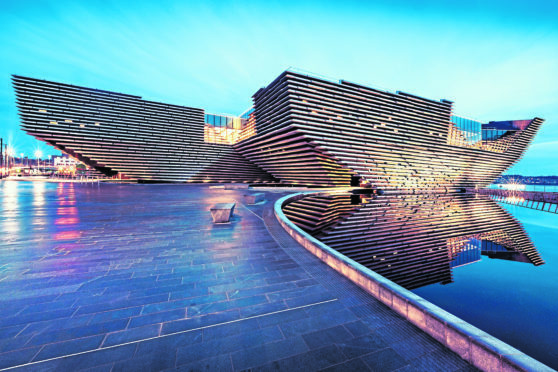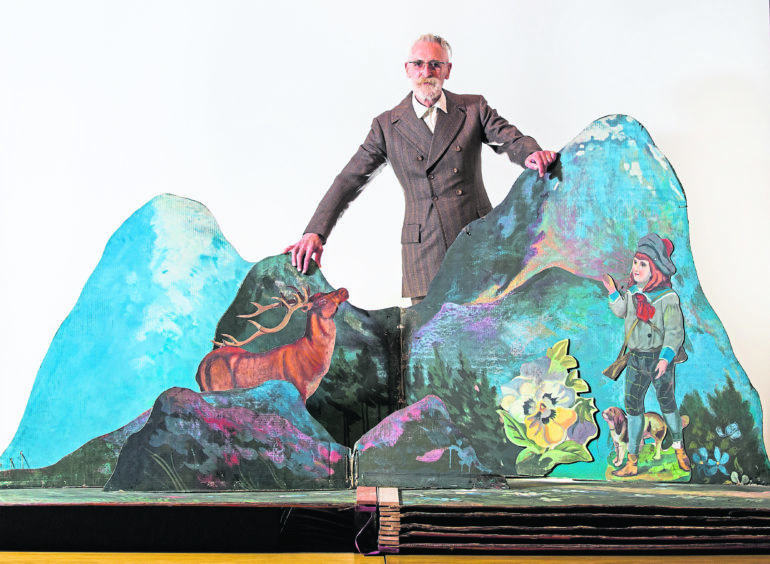Susan Welsh takes a trip to Dundee and discovers how the V&A Museum has made the city a must-visit destination.
It wasn’t until I visited Dundee’s V&A Museum last week that I learned a Highlander was responsible for creating “budgie smugglers” – that style of tight-fitting gents trunks which all the men I know refuse to wear, even when it’s scorching hot.
Spoilsports…
A forerunner of the trunks, the racerback swimsuit, made by Speedo, is on display. The Australian company was founded by Alexander MacRae, a lad from a wee village near Loch Kishorn. His creation looks very modest by today’s standards but caused moral outrage when it was revealed in the 1920s.
I also discovered a gown worn by Padmé Amidala in Star Wars: Attack of the Clones, created by Scottish costume designer Trisha Biggar, features Scotland’s famous Paisley pattern in the design. I then felt a wave of nostalgia wash over me on seeing the giant pop-up book John Byrne created for the iconic play The Cheviot, the Stag and the Black, Black Oil.
This first-floor gallery is packed with interesting objects telling Scotland’s story and, for some visitors, the highlight was the restored Oak Room designed by Charles Rennie Mackintosh.
I’m a fan of his work but wasn’t blown away by the room, which felt more like being inside a gloomy corridor.
Mackintosh’s work is polarising, rather like V&A Dundee. You either love it or hate it.
Me? I love it.
Designed by Kengo Kuma to be a new “living room for the city”, once you step through the cave-like entrance it’s spacious and bright inside with quirky windows offering different views of the ever-changing city, as well as a cafe and gift shop.
Upstairs, it’s even brighter with a swish restaurant overlooking another Dundee landmark, Captain Scott’s ship RRS Discovery, galleries and glass-fronted outdoor areas.
Admission is free, but you pay for visiting exhibitions such as the current one – Ocean Liners: Speed and Style – which is well worth seeing.
The museum has had a huge, positive effect on the city and its people, and there’s a real sense of civic pride and a buzz about the place which, for me, was summed up by one local woman I met inside who was quietly weeping.
These were tears of pride and she explained that, previously, when she’d tell people she was from Dundee they’d make remarks about it being the worst city in Scotland.
“I’d tell them about the beautiful parks, the riverside, the architecture and all the great art but no one believed me,” she said.
“Because of the V&A, opinions have changed and people are proud to say they are from Dundee again.”
She’s right to be proud, for this city has a huge amount to offer visitors.
In the UK’s first Unesco City of Design, former industrial spaces are now filled with artists and collectives while there’s a thriving gaming community.
I stayed at Hotel Indigo, housed within a converted 200-year-old jute mill. Stylishly renovated, the hotel’s room are inspired by the city’s past and present and feature original vaulted brickwork ceilings, comfortable large beds, superb en suites and a grand supply of comics to read!
It’s within easy walking distance of the bus and railway stations and handy for riverside and city centre attractions.
During a walking tour of the city we swung by the famous Caird Hall, the back of which overlooks Slessor Gardens – a new green space for concerts.
Places worth visiting include The Old Steeple, Scotland’s oldest medieval tower. On open days there’s guided tours, while those with a head for heights can climb the tower and be rewarded with outstanding views.
The Overgate Shopping Centre has an unusual claim to fame as it’s the only shopping mall in Europe with stores on just one side as the other side is largely glass, again offering fine views.
The West Port area of the city, which is home to a big dance festival each year, is pretty trendy with plenty of cocktail bars.
It’s popular with students – Dundee has the highest ratio of students in the UK which means overall, the population is pretty young. Even City Council leader John Alexander is only 30, but mature beyond his years and doing a terrific job as ambassador for the city.
Another “dead” interesting place is the Howff Graveyard, home to some 80,000 graves, many simply marked “foreign” or “Irish” which harks back to Dundee’s maritime history and the Irish famine.
A must-visit is the McManus Gallery. Almost as soon as you enter the gothic-sytle building you’ll see busts of Queen Victoria and Prince Albert. The building was originally commissioned as a memorial to Albert so it’s a nice full circle connection to the V&A.
For a bit of fun, The McMenace exhibition is great as it looks at the 80-year history of the Beano and its famous characters, from Dennis the Menace to The Bash Street Kids.
I only managed to scratch the surface of what this City of Discovery has to offer.
Future plans include regular bus tours on an electric bus, a city beach and new marina for 400 yachts to name but a few.
Dundee? They need to consider re-naming it Fundee!

